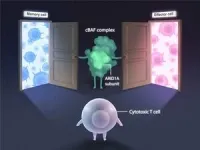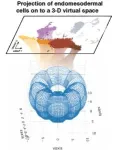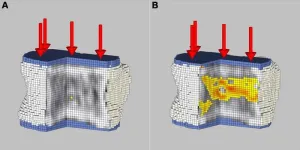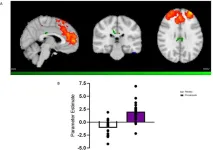(Press-News.org) LA JOLLA (June 13, 2023)—The immune system protects the body from invaders, such as bacteria, viruses, or tumors, with its intricate network of proteins, cells, and organs. Specialized immune cells, called cytotoxic T cells, can develop into short-lived effector cells that kill infected or cancerous cells within our bodies. A small portion of those effector cells remain after an infection and become longer-lived memory cells, which “remember” infections and respond when infections reappear. But little was known about what influences cytotoxic T cells to transform into these effector and memory T cell subtypes.
Now, Salk Institute Professor Susan Kaech and Associate Professor Diana Hargreaves have discovered that a protein complex called cBAF can open or close genetic “doors” to control T cell fate. The study, published in Immunity on June 13, 2023, illuminates how T cells fight and remember infections and paves the way for the development of more effective vaccines and cancer therapeutics.
“We’ve shown how T cells transform into specialized subtypes during an infection and what happens when they mess up the genetic blueprint. Without this genetic blueprint, T cells may not be able to resolve or remember infections, or could possibly become cancerous, like we see in T cell lymphoma,” says Kaech, senior and co-corresponding author, director of the NOMIS Center for Immunobiology and Microbial Pathogenesis, and holder of the NOMIS Chair. “Finding that the cBAF protein complex is essential in creating different T cell subtypes opens up new questions, like can we control this process to optimize immune cell function for cancer therapeutics?”
The question of how cytotoxic T cells develop into effector and memory T cells can be answered by looking at how they are created—a process that relies on genetic instructions contained in chromatin. Chromatin is composed of a mixture of genetic code (DNA) that works as instructions, as well as proteins and RNA that regulate and protect those instructions. Rearranging chromatin within a cell exposes or conceals different sections of genetic code, in turn altering the available instructions. Once instructions are available, proteins called transcription factors determine if and how often they are read.
The researchers knew that chromatin works like scaffolding—protecting the genetic code within and shielding it from transcription factors. For transcription factors to access those instructions, they likely need help from chromatin-remodeling cBAF, which can signal proteins and RNA to reveal genetic code for transcription factors.
“Chromatin remodeling is essential in determining the identities of cells,” says co-first author Bryan McDonald, a graduate student in the Kaech lab. “In other cell types, the chromatin remodeling complex cBAF was known to play a major role in cellular differentiation. We wanted to know if cBAF was important for cytotoxic T cell differentiation, too.”
The cBAF complex is made up of many subunits, including ARID1A. To explore the role of ARID1A on chromatin remodeling in T cells, the team examined T cells with and without ARID1A subunits in mice. After a week-long viral infection (to instigate the T cell immune response), the researchers looked for changes in chromatin structure, location of proteins, and genetic code accessibility.
“The chromatin landscape evolved immensely over the course of the infection,” says co-first author Brent Chick, a graduate student in the Hargreaves lab. “cBAF complexes bearing the ARID1A subunit were crucial in rearranging chromatin so transcription factors could access the genetic code that instructs the development of different T cell subtypes with specialized functions.”
Without ARID1A, the cytotoxic T cells could not turn into the short-lived, rapid-response effector subtype. The loss of ARID1A did not prevent the cytotoxic T cells from turning into their longer-lived memory subtype, but the memory cells made without ARID1A were not as effective at responding to a viral reinfection. Finally, the formation of memory T cells that reside in organs, like the lungs or small intestine, was dependent on ARID1A. Without ARID1A, tissue-resident memory T cells could not develop at all.
ARID1A was the key player, as the team suspected. And the mechanism was now clear—during infections, cBAF complexes with ARID1A open different chromatin “doors” to reveal genetic code to transcription factors, which then determine the fate of the cytotoxic T cells. Establishing this novel mechanism paves the way for investigation into how chromatin remodeling, genetic code, and transcription factors together contribute to a successful immune system response.
“Our research demonstrates that removing ARID1A from the immune response equation may greatly damage our ability to fight infection,” says Hargreaves, co-corresponding author and holder of the Richard Heyman and Anne Daigle Endowed Developmental Chair. “I hope that our findings inspire new questions in infectious disease and cancer research—and that we have demonstrated the value of asking those questions collaboratively.”
Next, the scientists plan to examine this mechanism using human T cells. Additionally, they aim to discern how memory T cells are affected by this process, since they are valuable prognostic tools for assessing human tumors.
Other authors include Nasiha Ahmed, Mannix Burns, Shixin Ma, Eduardo Casillas, Dan Chen, Thomas Mann, Carolynn O’Connor, and Nasun Hah of the Salk Institute.
The work was supported by the National Institutes of Health (F31HL158235, F99CA274688, 5T32GM133351, 2T32CA009370, R37 AI066232, AI151123, NCI CCSG: P30 014195), the Pew-Stewart Scholars for Cancer Research, the American Cancer Society Research Scholar Award, the Cancer Research Institute, the Damon Runyon Cancer Research Foundation, a Shared Instrumentation Grant (S10-OD023689), the Chapman Foundation, and the Helmsley Charitable Trust.
About the Salk Institute for Biological Studies:
Unlocking the secrets of life itself is the driving force behind the Salk Institute. Our team of world-class, award-winning scientists pushes the boundaries of knowledge in areas such as neuroscience, cancer research, aging, immunobiology, plant biology, computational biology, and more. Founded by Jonas Salk, developer of the first safe and effective polio vaccine, the Institute is an independent, nonprofit research organization and architectural landmark: small by choice, intimate by nature, and fearless in the face of any challenge. Learn more at www.salk.edu.
END
Mapping the development of infection-fighting immune cells
Salk scientists unravel the “BAFfling” puzzle of how infection- and cancer-fighting immune cells develop in mice
2023-06-13
ELSE PRESS RELEASES FROM THIS DATE:
Pew funds 22 scientists exploring pressing biomedical questions
2023-06-13
PHILADELPHIA—The Pew Charitable Trusts today announced the 22 researchers selected to join the Pew Scholars Program in the Biomedical Sciences. These early-career scientists will receive four years of funding to spearhead innovative studies exploring human health and medicine.
“From vaccine development to treatments for complex diseases, biomedical research is foundational to solving some of the world’s greatest health challenges,” said Susan K. Urahn, Pew’s president and CEO. “Pew is thrilled to welcome this new class of researchers and support their efforts to advance scientific knowledge and improve human ...
5 Pew-Stewart Scholars selected to advance cutting-edge cancer research
2023-06-13
PHILADEPHIA—The Pew Charitable Trusts and the Alexander and Margaret Stewart Trust announced today the 2023 class of the Pew-Stewart Scholars Program for Cancer Research.
These early-career scientists will receive four-year grants to explore new horizons in cancer development, diagnosis, and treatment. This class marks the 10th year the Alexander and Margaret Stewart Trust has partnered with Pew to build a legacy of innovative cancer research.
“Cancer is one of the most pressing challenges facing biomedical researchers today,” said Susan K. Urahn, Pew’s president and CEO. “Pew ...
Pew funds 10 Latin American scientists pursuing biomedical research
2023-06-13
PHILADELPHIA – The Pew Charitable Trusts today announced the 2023 class members of the Pew Latin American Fellows Program in the Biomedical Sciences.
These 10 postdoctoral fellows from seven Latin American countries—Argentina, Brazil, Chile, Colombia, Mexico, Peru, and Uruguay—will receive two years of funding to conduct research in laboratories throughout the United States. The fellows will work under the mentorship of prominent biomedical scientists, including an alum of the Pew Scholars Program in the Biomedical Sciences.
“Scientific ...
Most women diagnosed with early breast cancer can expect to become long term survivors, say experts
2023-06-13
Most women diagnosed with early stage breast cancer today can expect to become long term cancer survivors, finds a study published by The BMJ today.
The findings show that the average risk of dying from breast cancer in the five years after a diagnosis has fallen from 14% to 5% since the 1990s. For those diagnosed during 2010-15, more than six in 10 women had a five year risk of 3% or less.
The researchers say their findings can be used to reassure most women treated for early breast cancer that they are likely to become long term cancer survivors. ...
Which CFTR variants should be tested by laboratories? The ACMG releases updated carrier screening recommendations for cystic fibrosis
2023-06-13
The American College of Medical Genetics and Genomics (ACMG) has released updated recommendations for CFTR carrier screening –Updated recommendations for CFTR carrier screening: A position statement of the American College of Medical Genetics and Genomics. Pathogenic variants in the CFTR gene can cause cystic fibrosis (CF) as well as CF-related disorders. The new updated ACMG CFTR variant list includes a set of 100 variants.*
The new CFTR variant list represents an updated minimum recommended variant set for CF carrier screening and supersedes the previous group of 23 CFTR variants recommended by the ACMG. These revised recommendations apply to carrier screening, a type of genetic ...
Weight-loss surgery weakens bones of teens and young adults
2023-06-13
OAK BROOK, Ill. – A common weight-loss surgery for obese adolescents and young adults is found to have harmful effects on bones, according to a study published in Radiology, a journal of the Radiological Society of North America (RSNA).
“Childhood obesity is on the rise and weight-loss surgery is the most effective way to reduce weight and improve cardiometabolic comorbidities,” said the study’s lead investigator, Miriam A. Bredella, M.D., professor of radiology at Harvard Medical School in Boston, Massachusetts, and vice chair for Faculty Affairs and Clinical Operations, Department of Radiology ...
PeerJ announces Open Advances, a new journal series to address the world’s biggest challenges by unlocking Open Access
2023-06-13
PeerJ, the award-winning Open Access publisher, has announced the launch of the Open Advances series of journals, part of its ongoing commitment to democratizing scientific communication. The series will foster an equitable approach that empowers researchers worldwide to contribute valuable insights towards solving global challenges. The journals will be fully Open Access but will not charge authors a fee to publish.
The Open Advances series is a transformative endeavor that cements PeerJ's commitment to openness, innovation, ...
Overpayments to Medicare Advantage Plans could exceed $75 billion in 2023, USC Schaeffer Center research finds
2023-06-13
June 13, 2023 – Enrollment in the Medicare Advantage program – which allows Medicare beneficiaries to get their health care through plans administered by private insurance companies – has been growing so rapidly that it has recently surpassed enrollment in traditional Medicare. A new analysis by USC researchers warns that overpayments to Medicare Advantage plans now exceed 20 percent or $75 billion annually, underscoring the urgent need for reform.
Researchers with the USC Schaeffer Center for Health Policy & Economics found that the millions of beneficiaries in traditional Medicare who have switched to Medicare ...
Serotonin booster leads to increased functional brain connectivity
2023-06-13
Philadelphia, June 13, 2023 – Cognitive deficits accompany mood disorders and other psychiatric conditions, often with debilitating effects. Limited treatments currently exist, but studies in animals and humans have pointed to drugs such as the laxative prucalopride that activate serotonin receptors as a potential therapeutic for the symptoms. It has remained unclear, however, how the medication affects resting brain activity. Now, a new study in Biological Psychiatry: Cognitive Neuroscience and Neuroimaging, published by Elsevier, examines the drug’s effects in healthy human adults.
Serotonin receptors and the 5-HT4-type receptors in particular are found in areas ...
Positive parenting buffers stress’s effects on the brain
2023-06-13
Positive parenting—as reported by children and teenagers— protects young people from the deleterious effects of stressors like financial hardship or serious illness, according to a study. Jamie Hanson and colleagues examined magnetic resonance imaging (MRI) data along with survey data for 482 participants in an ongoing study, the Healthy Brain Network, who were between the ages of 10–17 at the time of data collection. Previous work has found associations between stress and small hippocampal volumes as well as between stress and behavioral problems—associations confirmed ...
LAST 30 PRESS RELEASES:
Start school later, sleep longer, learn better
Many nations underestimate greenhouse emissions from wastewater systems, but the lapse is fixable
The Lancet: New weight loss pill leads to greater blood sugar control and weight loss for people with diabetes than current oral GLP-1, phase 3 trial finds
Pediatric investigation study highlights two-way association between teen fitness and confidence
Researchers develop cognitive tool kit enabling early Alzheimer's detection in Mandarin Chinese
New book captures hidden toll of immigration enforcement on families
New record: Laser cuts bone deeper than before
Heart attack deaths rose between 2011 and 2022 among adults younger than age 55
Will melting glaciers slow climate change? A prevailing theory is on shaky ground
New treatment may dramatically improve survival for those with deadly brain cancer
Here we grow: chondrocytes’ behavior reveals novel targets for bone growth disorders
Leaping puddles create new rules for water physics
Scientists identify key protein that stops malaria parasite growth
Wildfire smoke linked to rise in violent assaults, new 11-year study finds
New technology could use sunlight to break down ‘forever chemicals’
Green hydrogen without forever chemicals and iridium
Billion-DKK grant for research in green transformation of the built environment
For solar power to truly provide affordable energy access, we need to deploy it better
Middle-aged men are most vulnerable to faster aging due to ‘forever chemicals’
Starving cancer: Nutrient deprivation effects on synovial sarcoma
Speaking from the heart: Study identifies key concerns of parenting with an early-onset cardiovascular condition
From the Late Bronze Age to today - Old Irish Goat carries 3,000 years of Irish history
Emerging class of antibiotics to tackle global tuberculosis crisis
Researchers create distortion-resistant energy materials to improve lithium-ion batteries
Scientists create the most detailed molecular map to date of the developing Down syndrome brain
Nutrient uptake gets to the root of roots
Aspirin not a quick fix for preventing bowel cancer
HPV vaccination provides “sustained protection” against cervical cancer
Many post-authorization studies fail to comply with public disclosure rules
GLP-1 drugs combined with healthy lifestyle habits linked with reduced cardiovascular risk among diabetes patients
[Press-News.org] Mapping the development of infection-fighting immune cellsSalk scientists unravel the “BAFfling” puzzle of how infection- and cancer-fighting immune cells develop in mice




